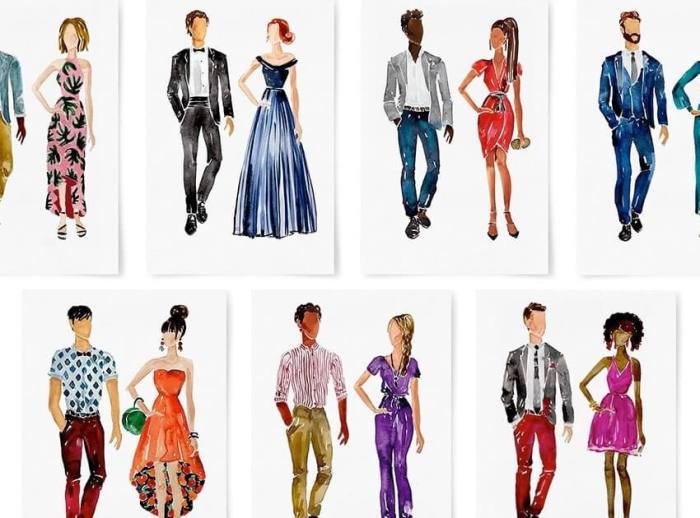Wedding Dress Styles & Trends
Dress up wedding dress – The world of wedding dresses is vast and ever-evolving. Understanding current trends and classic styles is crucial for finding the perfect dress. This section explores current trends, classic silhouettes and their modern adaptations, neckline and sleeve variations, and fabric choices for different seasons.
Current Wedding Dress Style Trends
Five prominent trends currently shaping wedding dress styles include: the resurgence of minimalist designs emphasizing clean lines and luxurious fabrics; the continued popularity of bohemian styles with flowing silhouettes and delicate lace; the rise of structured silhouettes with strong shoulders and defined waists; the incorporation of unique textures like feathers, sequins, and 3D floral appliqués; and the increasing acceptance of diverse colors beyond traditional white, such as blush, champagne, and ivory.
Classic Wedding Dress Silhouettes and Modern Interpretations
Classic silhouettes like the A-line, ballgown, and mermaid remain popular, but modern interpretations often feature unexpected details. For instance, a modern A-line might incorporate a plunging neckline or unique sleeve details, while a modern ballgown might have a more fitted bodice or a shorter train. The mermaid silhouette, traditionally quite form-fitting, now sees variations with more forgiving fabrics and less restrictive seaming.
Necklines and Sleeve Styles in Wedding Dresses
Necklines and sleeves significantly impact a dress’s overall aesthetic. Sweetheart necklines remain timeless, while plunging necklines offer a more modern and daring look. Off-the-shoulder styles are romantic, while halter necklines provide a sleek and sophisticated feel. Sleeve styles range from classic long sleeves to short puff sleeves, cap sleeves, and sleeveless options, each offering a unique aesthetic.
Wedding Dress Fabrics and Seasonal Suitability
Fabric choice influences both the look and feel of a wedding dress. Lace is a classic choice, suitable for various seasons and styles. Silk is luxurious and drapes beautifully, ideal for warmer climates, while heavier fabrics like satin or brocade are better suited for cooler weather. Lightweight chiffon or organza works well for summer weddings, providing a breezy and ethereal feel.
Accessorizing the Wedding Dress
Accessories can transform a simple wedding dress into a unique and unforgettable look. This section will explore three distinct accessorizing styles for an A-line dress, jewelry selection, veil choices, and complementary hairstyles.
Three A-Line Wedding Dress Accessory Looks
Here are three distinct accessorizing styles for a simple A-line wedding dress:
- Romantic Look: Delicate floral crown, flowing cathedral-length veil, and dainty pearl earrings and necklace.
- Modern Look: Geometric statement earrings, a sleek updo, and a short, birdcage veil or no veil at all.
- Bohemian Look: Long flowing earrings, a flower crown, a lace bolero jacket, and a simple, flowing veil or none.
Choosing Jewelry to Complement a Wedding Dress
Jewelry should complement the neckline and overall style of the dress. A plunging neckline pairs well with long, delicate necklaces or statement earrings. A high neckline might be better suited to a simple pendant or stud earrings. Avoid overwhelming the dress with too much jewelry.
The Impact of Veils on Wedding Dress Aesthetics
Veils add a touch of elegance and mystery. A cathedral-length veil creates a dramatic effect, while a birdcage veil offers a more playful and vintage feel. A blusher veil adds a touch of tradition, while a simple elbow-length veil provides a more understated elegance. The choice depends entirely on personal preference and the overall wedding aesthetic.
Suitable Hairstyles for Various Wedding Dress Styles
The hairstyle should complement the dress and the bride’s personal style. A sleek updo works well with structured gowns, while loose waves or braids complement bohemian styles. A classic chignon suits a traditional ballgown, and a half-updo can be versatile for various styles. Consider the neckline and overall silhouette of the dress when choosing a hairstyle.
The Dress Up Experience: Before the Wedding

Source: greenvelope.com
Finding and preparing your wedding dress is a significant part of the wedding planning process. This section guides you through the process, from initial browsing to final alterations.
Finding the Perfect Wedding Dress
Start by browsing magazines, websites, and bridal boutiques to get an idea of styles you like. Schedule appointments at several boutiques and bring photos for inspiration. Consider your body type, wedding venue, and personal style when making your selection. Remember to factor in time for alterations.
Trying On Wedding Dresses: A Step-by-Step Guide
When trying on dresses, wear nude undergarments and comfortable shoes. Bring along a trusted friend or family member for opinions. Take photos and videos to compare different styles. Don’t be afraid to step outside your comfort zone and try on different styles.
Budgeting for a Wedding Dress and Associated Costs
Set a realistic budget for your wedding dress, including alterations, cleaning, and preservation. Consider the overall cost of your wedding and allocate a reasonable amount for the dress. Shop around and compare prices to find the best value.
The Importance of Professional Alterations
Professional alterations are crucial for achieving the perfect fit. A well-fitting dress enhances your comfort and confidence on your wedding day. Find a reputable seamstress with experience altering wedding dresses. Schedule multiple fittings to ensure a flawless result.
The Dress Up Experience: On the Wedding Day
Careful preparation ensures your wedding dress looks its best on your big day. This section offers a checklist and guidance for handling your dress.
Wedding Day Dress Checklist

Source: bergamotbridal.com
A checklist ensures everything is in place. Confirm the dress is clean and pressed. Pack all necessary accessories, including undergarments, shoes, and jewelry. Arrange for safe transportation and storage. Have a designated person to help you get dressed.
Transporting and Storing the Wedding Dress
Transport the dress in a garment bag to protect it from damage. Store the dress in a cool, dry place, away from direct sunlight. Consider professional preservation to protect it for years to come.
Putting on a Wedding Dress
Start by putting on undergarments and any shapewear. Carefully slip into the dress, ensuring it is positioned correctly. Fasten any closures or zippers. Adjust any straps or details as needed. Take your time and ask for assistance if needed.
Importance of a Trusted Helper on the Wedding Day
Having a trusted friend or family member help you get dressed is essential. They can assist with zipping, buttoning, and adjusting the dress, ensuring you look your best. They can also help manage accessories and keep you calm and relaxed.
Visual Representation: Wedding Dress Styles: Dress Up Wedding Dress
This section provides visual descriptions of various wedding dress styles, including suitable accessories and ideal venues.
Wedding Dress Style Table
| Dress Style | Description | Suitable Accessories | Ideal Venue |
|---|---|---|---|
| A-Line | Flattering silhouette, fitted at the bodice and flaring out from the waist. | Delicate necklace, simple earrings, cathedral-length veil | Church, garden, ballroom |
| Ballgown | Full, voluminous skirt and fitted bodice. | Statement earrings, tiara, elbow-length veil | Grand ballroom, historic mansion |
| Mermaid | Fitted bodice and skirt that flares out at the knees. | Long earrings, statement necklace, short veil | Beach, vineyard, upscale restaurant |
| Sheath | Simple, column-like silhouette. | Minimalist jewelry, simple hairstyle, no veil | Modern art museum, city hall |
| Empire Waist | Fitted bodice just below the bust, flowing skirt. | Dainty necklace, flower crown, short veil | Beach, garden, rustic barn |
Mermaid-Style Wedding Dress, Dress up wedding dress
Imagine a mermaid-style gown crafted from luxurious silk charmeuse, its smooth surface subtly shimmering under light. Delicate lace appliqués cascade down the fitted bodice, accentuating the curves before gracefully flaring out from the knees, creating a dramatic yet elegant silhouette. The train flows elegantly behind, adding a touch of regal grandeur.
Ballgown Wedding Dress
Picture a classic ballgown, its bodice crafted from ivory satin, delicately embroidered with sparkling crystals that catch the light. The full skirt, made from layers of tulle, creates a cloud-like effect, billowing around the bride. The bodice features a sweetheart neckline, accentuating the décolletage, and is cinched at the waist with a delicate satin ribbon. The overall texture is luxurious and opulent.
Sheath Wedding Dress
Envision a minimalist sheath dress in crisp crepe, its clean lines and simple silhouette exuding modern sophistication. The fabric’s subtle texture adds depth without distracting from the dress’s elegant simplicity. The straight, column-like design falls gracefully to the floor, creating a timeless and chic look. The overall aesthetic is refined and understated elegance.
Clarifying Questions
Can I wear a wedding dress more than once?
Absolutely! Many brides choose to wear their wedding dress again for other special occasions or even for photoshoots.
How long does it take to alter a wedding dress?
Alterations can take anywhere from a few weeks to several months, depending on the complexity of the changes needed.
What should I do if my wedding dress gets stained?
Act quickly! Blot (don’t rub) the stain and seek professional cleaning as soon as possible.
How do I choose the right undergarments for my wedding dress?
Consider the style of your dress and choose seamless, smooth undergarments that won’t show through the fabric. A professional fitting can be helpful.
